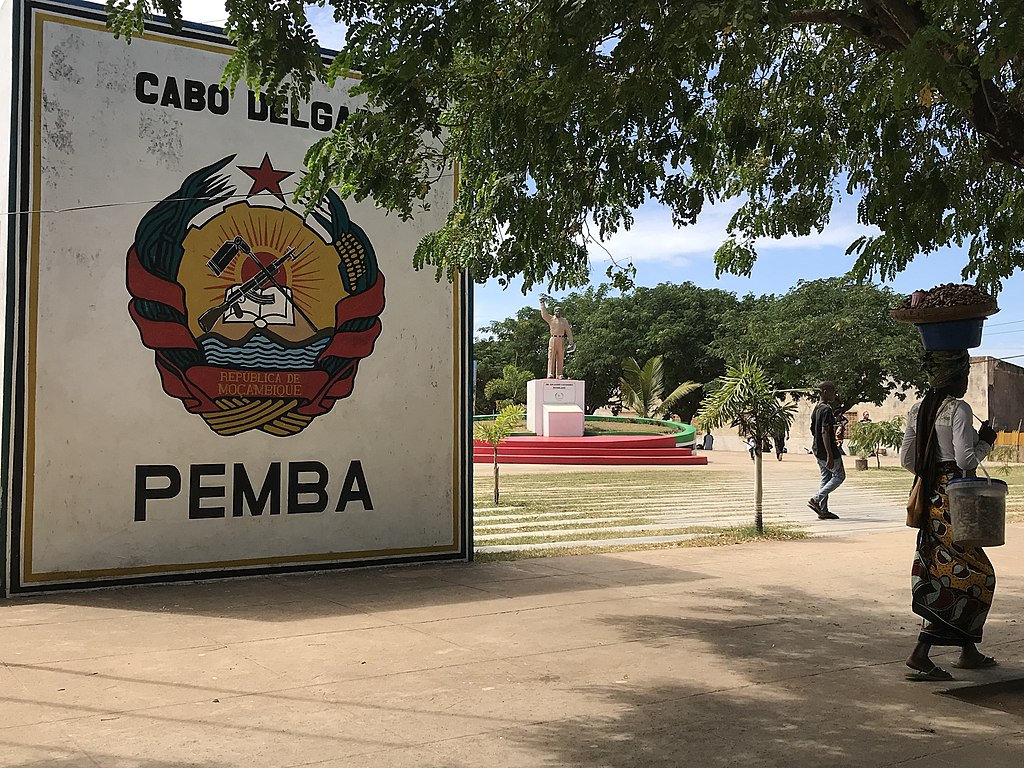Praça dos Heróis na cidade de Pemba, Cabo Delgado, Mozambique, VOA.
“With the onset of the rainy and cyclone seasons, the cumulative impact of years of conflict and the worsening humanitarian emergency, it is more important than ever that Medicines Sans Frontiers teams have unrestricted and safe access to the area…”
On 4 February, the international affairs focused Brazilian publication portalrbn.com published the excerpted article on northern Mozambique’s transition from active military conflict to post-conflict reconstruction. According to the article, many civilians in Cabo Delgado remain displaced and lack medical care, while attacks by militants loyal to the Islamic State in Iraq and Syria persist. For example, the militants carried out 20 attacks in the last two weeks of January, torching 2,800 homes and forcing 14,000 people to flee their villages. The article indicates the military has retaken almost all the territory that the militants captured in 2021 but have not been able to prevent continued attacks on civilians.
Based on interviews with Medicines Sans Frontiers (MSF) personnel in the area, the article suggests that in addition to providing security, the military needs to find ways to provide medical care and protection against cyclones to aid displaced people. If the military fails to do so, MSF warns the humanitarian crisis will spiral out of control, which will then affect the broader post-conflict recovery.
In fact, further military support to Mozambique is expected in coming months. A 3 February article from South Africa-based news24.com noted that South African president Cyril Ramaphosa promised to continue South Africa’s deployment of 1,500 troops to Mozambique and allow for new investment to assist Mozambique’s post-conflict recovery. According to the article, this will be essential to restoring normalcy to Cabo Delgado and allow for the reconstruction of northern Mozambique and the alleviation of the humanitarian crisis. The article notes that Tanzania and Rwanda are also deploying forces to secure northern Mozambqiue and revitalize its economy, signaling a regional effort in ending the insurgency.
Source:
“Ataques e violência em Cabo Delgado deslocam milhares de pessoas no início da temporada de ciclones (Attacks and violence in Cabo Delgado displace thousands of people at the start of cyclone season),” portalrbn.com (Portuguese language international affairs focused Brazilian publication), 4 February 2022. https://portalrbn.com.br/mocambique-ataques-e-violencia-em-cabo-delgado-deslocam-milhares-de-pessoas-no-inicio-da-temporada-de-ciclones/
A significant part of Cabo Delgado’s population is now extremely vulnerable to displacement and the lack of access to medical care. Local authorities have reported more than 20 attacks on four villages in the last two weeks with 2,800 homes damaged or destroyed by fire. This is the biggest wave of displacement in recent months. “Violent attacks and continued insecurity in several districts of central Cabo Delgado have led thousands of people to leave their homes with only what they could carry, just as the cyclone and rain season is starting,” says Raphael Veicht, chief of the Médecins Sans Frontières (MSF) emergency unit.
With the onset of the rainy and cyclone seasons, the cumulative impact of years of conflict and the worsening humanitarian emergency, it is more important than ever that MSF teams have unrestricted and safe access to the area so they can provide people with the necessary care. It is absolutely crucial that medicines and medical supplies can be imported quickly without bureaucratic delays.
Source: “’We are fighting to bring peace’: Ramaphosa visits insurgency-hit Mozambique,” news24.com (South Africa based on-line news), 3 February 2022. https://www.news24.com/news24/southafrica/news/we-are-fighting-to-bring-peace-ramaphosa-visits-insurgency-hit-mozambique-20220203
President Cyril Ramaphosa visited northern Mozambique, supporting the government’s latest effort to reassure neighbours and investors that an Islamist uprising is under control. Over the last week, Mozambique has tried to reassure neighbours and investors that their efforts are worthwhile. Tanzanian President Samia Suluhu Hassan visited last Friday and TotalEnergies boss Patrick Pouyanne met Nyusi in Maputo on Monday. Rwandan forces last week also allowed journalists a rare visit, to see how life is slowly returning to some of the hardest-hit areas.
Image Information:
Image: Praça dos Heróis na cidade de Pemba, Cabo Delgado, Mozambique, VOA.
Source: https://commons.wikimedia.org/wiki/File:Pra%C3%A7a_dos_Her%C3%B3is_na_cidade_de_Pemba,_Cabo_Delgado,_Mozambique,_VOA.jpg
Attribution: CC x 2.0


